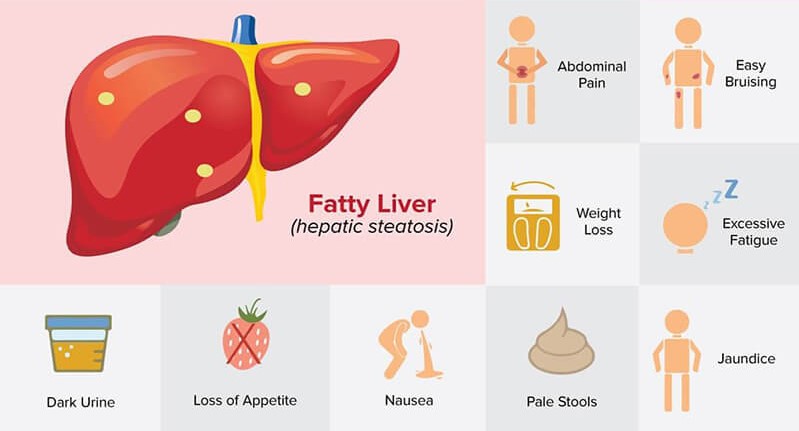- 27-Feb-23
The liver is a substantial organ in the belly that filters blood among other essential bodily functions. It also meets the definition of a gland because it generates compounds that are vital to human life.
Liver Function:
The liver is a vital organ that performs numerous life-sustaining processes:
- Bile is produced, which aids with digestion.
- Creates proteins that the body needs.
- Controls how iron is used and absorbed by the body.
- Transforms food into energy.
- Produces chemicals that aid in blood clotting (stick together to heal wounds).
- By producing immune components and clearing your blood of germs and toxins (substances that might harm your body), helps you resist illnesses.
Fatty Liver Disease:
The buildup of extra fat in the liver is the main cause of the prevalent disorder known as fatty liver disease. Most people exhibit no symptoms and don't have any significant problems. Nonetheless, liver damage might occasionally happen as a result. The good news is that fatty liver disease can frequently be prevented or even reversed by making lifestyle changes.
Fatty Liver Symptoms:
People with fatty liver disease typically do not exhibit any symptoms until the disease has reached the stage of Liver Cirrhosis. If you do, the following signs can be present:
- Constantly feeling weak and exhausted.
- Losing weight.
- A discomfort or soreness in the upper right portion of your stomach.Nausea.
- Liver-regional swelling.
- Weak appetite.
Some fatty liver disease patients encounter adverse effects such liver scarring. Another term for liver scarring is Hepatic Fibrosis. Significant liver fibrosis leads to cirrhosis, a potentially fatal condition that can cause liver failure.
Fatty Liver Causes:
The following factors can make you more at risk of developing fatty liver diseases:
- Being overweight or obese.
- Having a disease like type 2 diabetes or polycystic ovarian syndrome that alters how much insulin your body produces (PCOS).
- A metabolic syndrome diagnosis (a trio of high blood pressure, obesity and diabetes).
- An elevated blood pressure.
- Having hypothyroidism.
- Smoking.
- Being older than 50.
Fatty Liver Treatment:
There is no medicine that treats fatty liver disease specifically. Instead, clinicians concentrate on assisting you in managing the conditions' contributing elements. Also, they advise making lifestyle adjustments that might greatly enhance your health. Therapy consists of:
- Alcohol abstinence.
- Weight loss.
- Taking prescription drugs to control one's triglycerides, cholesterol, and diabetes (fat in the blood).
- Combining vitamin E with some thiazolidinedione medications, such as Actos and Avandia, to manage diabetes.
When to see a Doctor?
Without any signs, liver disease can develop for months or even years. As symptoms start to show, liver damage is frequently severe. A doctor's appointment is necessary for some symptoms.
Liver Specialist in Lahore:
Integrated Medical Care Hospital (IMC Hospital) is one of the most prestigious institutions in Pakistan which is known for its performance and outstanding results regarding Hepatology (Liver Specialist). Here you find one of the Best Hepatology (Liver Diseases) Specialists in Lahore Pakistan. Visit today and book your appointment at Integrated Medical Care Hospital (IMC Hospital).
Prof. Surgeon Asim Malik
BS(KE), FRCS(UK), FICS (USA), DIP LAP. (France) - Chief of Surgery (IMC).
Team: Surgeon Ossama Ather (BS, MRCS), Lady Surgeon Iram Naseem (BS, MRCS), Lady Surgeon Saima Amjad(BS, FCPS), Surgeon Hisham Ahmed (BS, FCPS)
Specialties: Surgery, Laparoscopic Surgery, Bariatric Surgery.
Areas Of Focus: Advance Laparoscopic, Vascular & Cancer Surgery, Surgical Gastroenterology, Bariatric (Weight Loss) Surgery Laparoscopic Gynaecology, Minimal Invasive Endocrine Surgery ( Thyroid, Para Thyroid & Adrenals).

 Map
Map










